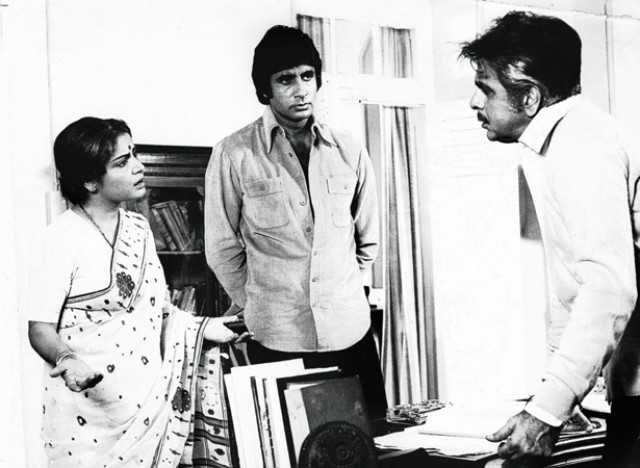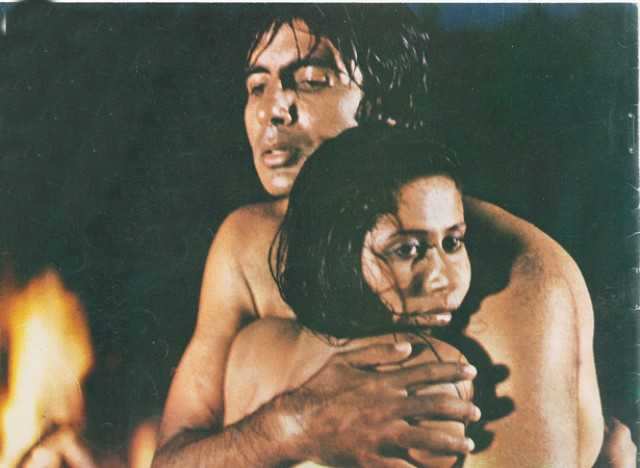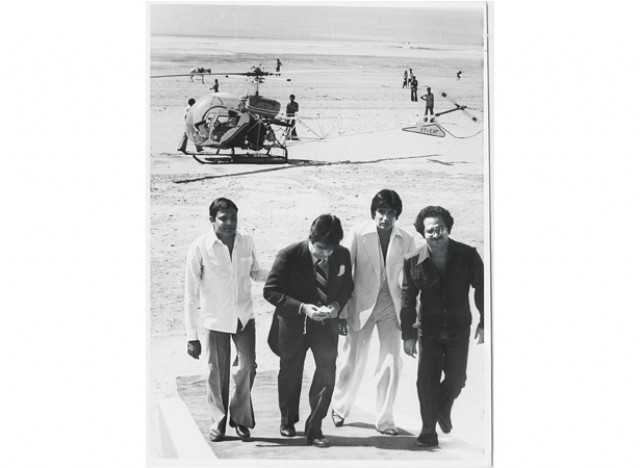Aye aasman bata
Kya tujhko hai khabar
Ye mere chaand ko kiski lagi nazar
Mujhse kahan na jaane koi bhool ho gayi...
The lament of a father, also an upright police officer, rising above the screeching aircrafts to resonate in the dark skies as his son lies dead in his arms... cut a picture of epic devastation. It was not only the denouement of the film Shakti (1982) but also an affirmation of the icons that Dilip Kumar and Amitabh Bachchan are on the tarmac of cinema. Ramesh Sippy may never be able to live down the glory of the best-seller Sholay (1975) but he has yet another coup in his oeuvre in the form of Shakti. Not only does it celebrate the wizardry of screenwriting, it also celebrates the spunk of the director who made two mega stars face the camera for him as well come face to face with each other’s prowess. Yes Shakti was a power duel... where there were two winners! “With the actors I had, with the script I had, if I didn’t turn out a beautiful film how would I be able to forgive myself? The world would be unforgiving too,” states Sippy. His words, his memories... a classic revisited...

Casting tales
Like all directors, I too had a desire to make a film with Dilip Kumar – the Supremo. I discussed with Salim-Javed if we could think of a subject, which would suit Yusuf saab (Dilip Kumar). The South film, Thanka Pathakkam (1974), a story of a father-son conflict seemed interesting. Shivaji Ganesan had played both the father and the son. Producers Mushir-Riaz bought the rights of the film. But I wanted different actors for the roles of the father and son. I believe a double role somewhere restrains histrionics.
Dilip saab’s career, those days, had hit a lull. He was playing double and triple roles. His films were going off target. Also there was talk about him getting ‘too involved’ with his films. In fact, his involvement was being regarded as ‘interference’ by filmmakers. There were instances where during the filming he was known to have said ‘something’s not right with the film, let’s shoot all over again’.
There was worry about how one would deal with such a situation. I couldn’t have said, ‘Sir, let me do my work’. So Mushir bhai (producer) and Salim bhai (Khan) went to Dilip saab (they didn’t tell me about it then). They told him, “Here’s a great role, a good director… someone who could do justice to you. But he’s worried about you getting too involved with the film.” Dilip saab reacted, “No, no, I’m not like that.” They stated frankly, “Let Salim-Javed write the film, let Ramesh Sippy direct it, you just give a good performance.” They came back and told me that Dilip saab had said, “I myself do not like to get over involved because then I get lost.” The discipline was clarified at the onset. Dilip saab was the first one to be signed.
The father’s role, that of DCP Ashwini Kumar (Dilip Kumar), was definitely more overpowering than son Vijay’s who was a traumatised character. So I suggested we take a newcomer for the son’s role to cut out ego problems. Amitabh’s name did come up. But since he was a huge star we couldn’t offer him the second role. We auditioned a new actor. But how do we get that brooding intensity? Meanwhile, Amitabh heard we were scouting for such a character. He asked, “Why am I not in this?” After all, we shared an old association.
What we wisely did was narrate the script to both, Dilip saab and Amitabh, together. I told Amitabh, “Yours is a straight-jacketed role. There’s no occasion for flamboyance. You have to emote from within.” The son’s feelings towards his father take a somersault when as a young boy he’s kidnapped by a criminal and his father is willing to give him up for the sake of his duty. As he grows, the animosity towards his father affects their relationship. Amitabh loved the script; he loved the idea of doing a film with Dilip saab. His self-belief was high and he was assured that things would not change later.
Coming to Raakhee, hers had been a strong romantic pairing with Amitabh. But she wanted to work with Dilip Kumar. I too convinced her saying, “You’ve played Amitabh’s lover in many films. You’ll do some more. But where will you get a chance to do a film with Dilip Kumar?” Raakhee was appreciated in the film though she later accused me in jest of ‘killing’ her career. Smita Patil, as Vijay’s live-in girlfriend Roma, was also a waiting-in-the wings character. But it takes guts to stand in the wings. Your contribution, big or small, only adds to the total film.

Lights, camera, action!
Sholay was an action-adventure film. Its canvas was huge and hence the 70mm and the stereophonic sound suited that. Shakti focussed on the angst between a father and son. It was like a play. So it had to be intimate. The first scene we shot was with Raakhee in the kitchen, Dilip saab and she enjoying a causal banter. His playful mood continues as he walks over to answer the phone saying, “Coming… coming!”… where he’s informed that his son has been kidnapped. We did 85 takes for that shot.
As the shooting progressed, Dilip saab grew comfortable with me. A couple of times, he’d put his arms over my shoulders, take me aside and try to suggest a change in the scene saying ‘suppose we do it this way’. I’d listen to him patiently and then explain my viewpoint saying, “As an actor you’ve shown me a new side. Normally, I’d have jumped at it. But this will seem inconsistent with your character’s graph.” He’d immediately agree, “You’re so right. I’m sorry! We’ll go your way.” If you say the right thing the actor respects you and doesn’t override you. I never interfered in their acting. I didn’t enact the scenes for them. I let them take it forward. My job was to keep them within the bandwidth of their characters.
Super scenes!
Dilip saab and Amitabh, both excelled in this one scene, shot against the stillness of Sheetal’s (Raakhee) funeral. Both of them had to express grief in their own way. It was an introverted moment for the flying-off-the-handle Ashwini Kumar. He’s in disbelief, he’s broken and is sitting huddled in one place. Just then Vijay walks in. His mother had kept them together. She was the common bond, the buffer. He could have been angry with his father. But when he sees him shattered for the first time, in that moment he becomes the father. He touches his arm gently to express his sympathy. In that fleeting moment, the two exchange a glance... just when the police take him away.
The last scene where Vijay dies in the arms of his father at the airport remains memorable too. It was here where he finally bursts out with his anguish. It was shot in one take. Since Vijay is lying in his father’s arms, Dilip saab couldn’t move much. His behavior then became a constant. It gave more freedom to the co-actor. We kept the crane camera floating so that we didn’t lose any moment. We wrapped up around 5 am. To say the performances rose above the script is unfair. You only bring to life what’s written on paper. It was not difficult for Salim-Javed to have written ‘clap track’ dialogue. To write with restraint keeping the emotions tight was difficult. They played to the strength of the actors within the boundaries of the characters.

Dilip Kumar salutes Amitabh
We were put up at the Centaur hotel while we shot this death scene. There Dilip saab shared something precious with me. He said, “Maine bhi apni zindagi mein bahut accha kaam kiya hai. I had heard about this young boy – Amitabh Bachchan. I had watched his work too. I saw Shakti as the coming together of two good actors. But now, I understand why he is where he is. He has many qualities - he’s persevering, hardworking, disciplined and much more… but above all he understands technique. He acts beautifully but he acts for the camera. Whereas I get carried away. I ask for more freedom from the camera. I want to first feel by instinct and then react. He understands all of that… but he also does his homework in his head. So when he performs he’s aware where the camera is and knows how to get it right. That’s why he has a right to be where he is.” In a sense that was Dilip saab’s salute to Amitabh.
Shakti and after…
After the release, Dilip Kumar got more attention from the critics. A famous critic wrote, “Mr Kumar has Mr Bachchan for breakfast.” It was clearly not in good taste. This affected Amitabh. There was some tension for a while. He felt injustice was done to him. The press reviews, the coterie around him were of the opinion, ‘Yeh to hona hi tha. Dilip Kumar ka palhada bhari hi hoga!’
Luckily, both had heard the narration together. Amitabh knew not a single line was cut. Yes, there was certain imbalance to his character – in that he had to internalise everything – but that was the premise. And only an actor like Amitabh could have held his own in front of Dilip saab. And he did have his moments. Apart from the death scene, his drunken scene was shot in one single shot – it involved 700 feet of film.
To add to it, the Filmfare Award going to Dilip Kumar for Best Actor only reiterated Amitabh’s belief that he was indeed short-changed. But it couldn’t be forgotten that Salim- Javed had a big hand in his unprecedented success. Why would the director and writers ever intend such a thing? Actually, Amitabh was not upset with the film but with the critics who made it seem like his failure. Nevertheless, over time he went on to own the film completely. Today he counts it among his best performances.
On a lighter note, the critics then also listed 20 reasons why Jeetendra’s Farz Aur Kanoon released the same year with a similar theme was a better film. No doubt, it was a hit. But the comparisons were utterly laughable! Well, the ways of showbiz...